Last week Mr D & I went down to Nelson to celebrate Thanksgiving with his parents (who have adopted it since I moved to NZ, to help me feel at home, because it’s my favourite holiday, and because they are lovely).
It’s always wonderful to go down to Nelson, but it was particularly good to get away after the upset in Wellington after the earthquakes. Ironically, we were going closer to the epicenter, but Nelson has had much less damage than Wellington (they say 11% of the city centre is shut down). Being there felt like escaping, and just helped reset my equilibrium.
My wonderful mother-in-law helped with the escape feel by taking my antique shopping – where I promptly found the most exciting thing I’ve ever found at an op-shop.
I was digging through a chest of fabric (nothing interesting) when I noticed something that looked a bit like a fashion plate in a cabinet next to me.
Curious, I pulled it out. It was a pretty 1920s dress, with some odd notes. And then I realised there was a stack of pattern papers next to it.
Could it be…!?!
A quick check of the pattern tissues suggested they did indeed belong to the dress. How fabulous! I mean, it was for a teenager, but 1920s patterns are hard to come by in NZ.
And then I noticed something far, far more fabulous than a 1920s pattern – as exciting as that is. Fabric. 1920s fabric. And…it looked just like the fabric in the design sketch!
Could it be…!?!
Yes!
It’s a full 1920s dress kit – the sewing pattern, fabric, and trimmings to make a complete frock!
Dress kits were quite popular in the teens and ’20s. They were more economical than a ready-made or seamstress-made dress, but allowed the home dressmaker to have the look of a designer dress, with matching notions and embellished fabric, with features (like the embroidered hem) that would be nearly impossible to replicate at home.
I’ve read about them in period sources, but have never seen one before. Most were, of course, made up, and other were broken into their individual parts.
Find one is SO exciting! It’s a fabulous piece of fashion and sewing history, and of social history.
The fabric is a very lightweight cotton, with a slightly open weave. It’s not nearly as soft as a voile, but might soften with washing.
The embroidery and ribbon are almost certainly rayon (viscose). The embroidery in machine done.
I haven’t managed to find out a great deal about the kit, but I have ascertained that it was made by the Swiss embroidery firm Sonderegger & Co (this guy’s family’s business), which published a notification that it would be doing business in Auckland, NZ, in August 1926, though it had been taking pre-sales since at least January.
This exactly matches the kit, which I would date to 26-28. Sonderegger & Co also utilised travelling saleswomen, but cease selling in NZ in 1933, probably due to the global economic downturn after 1929. The kit may also have been purchased overseas and brought back to NZ, immediately, or at a later date.
So, the obvious question is, am I going to make it up?
Probably not the fabric, but I definitely intend to make up the pattern in a modern fabric, to see what it looks like! That way I can see what the dress would look like, while keeping the kit intact.
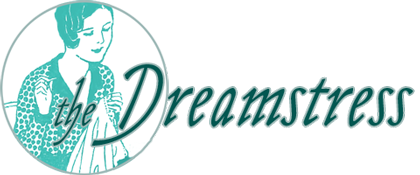
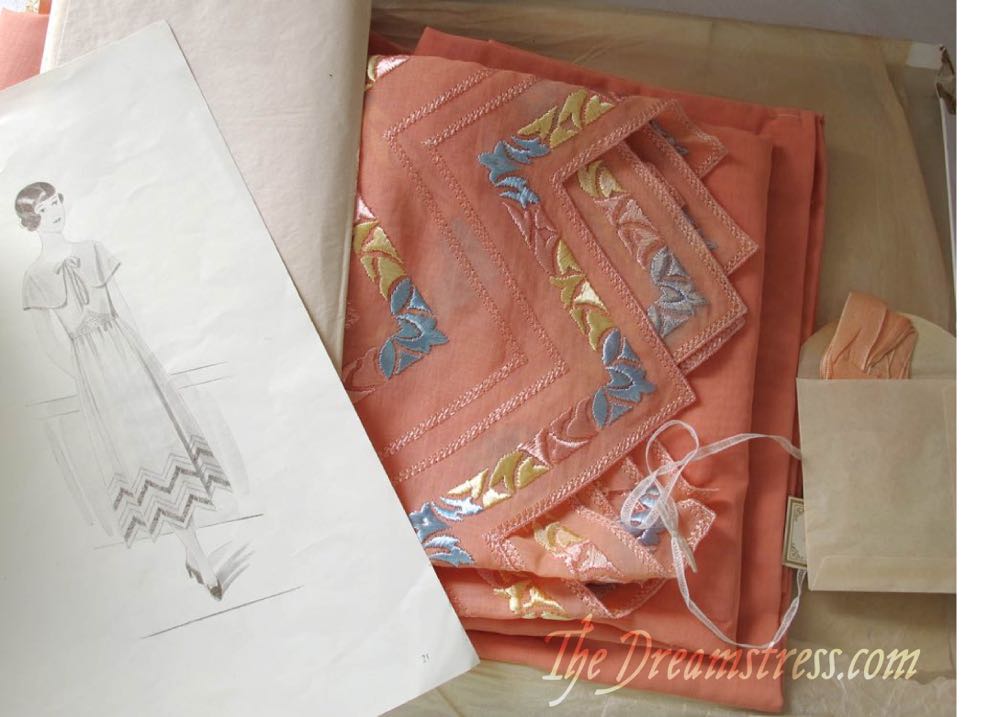
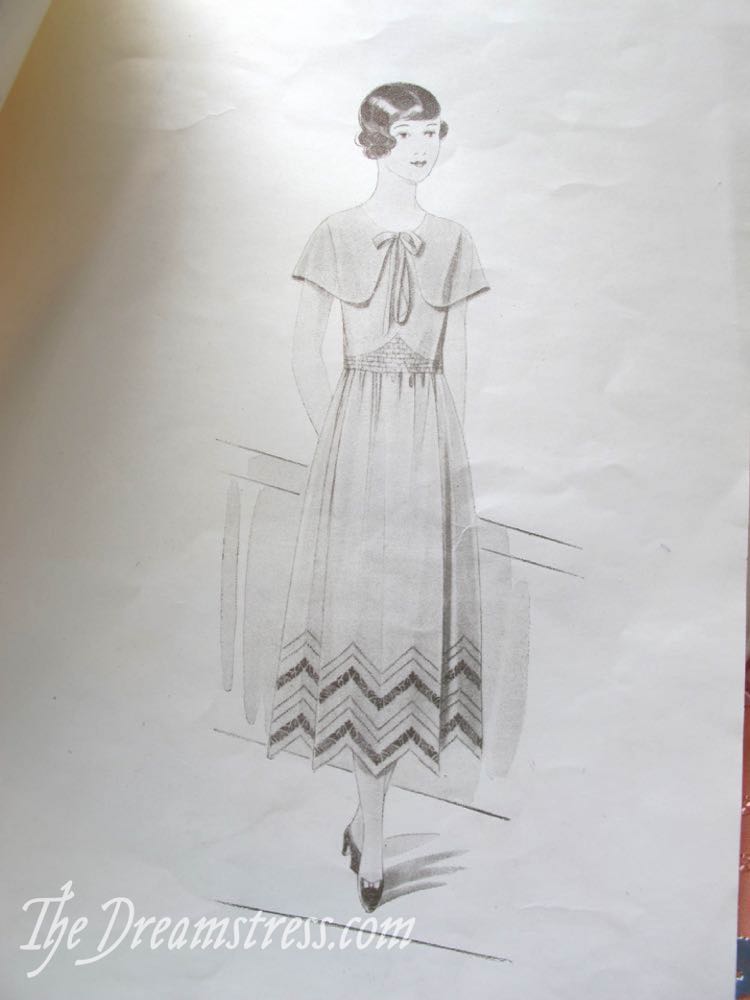
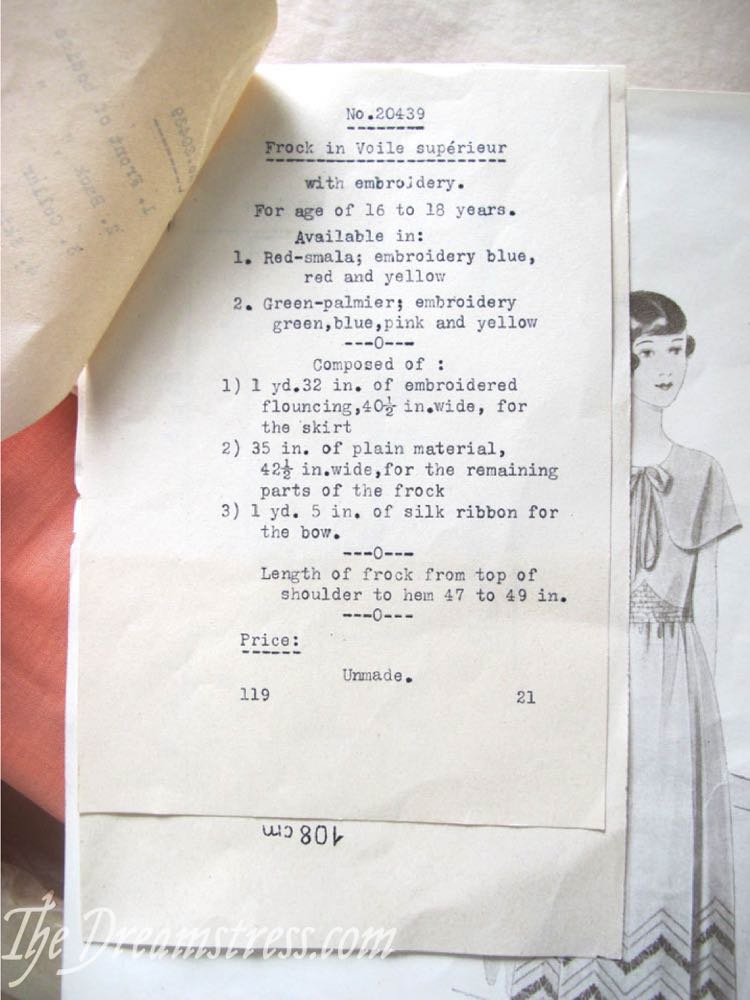
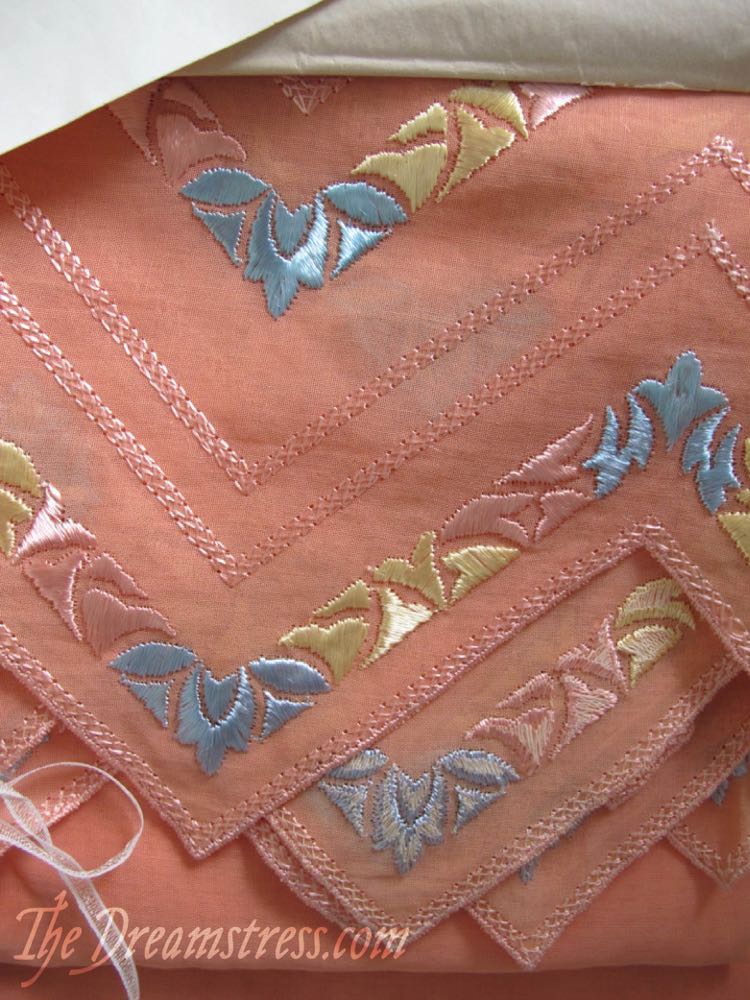

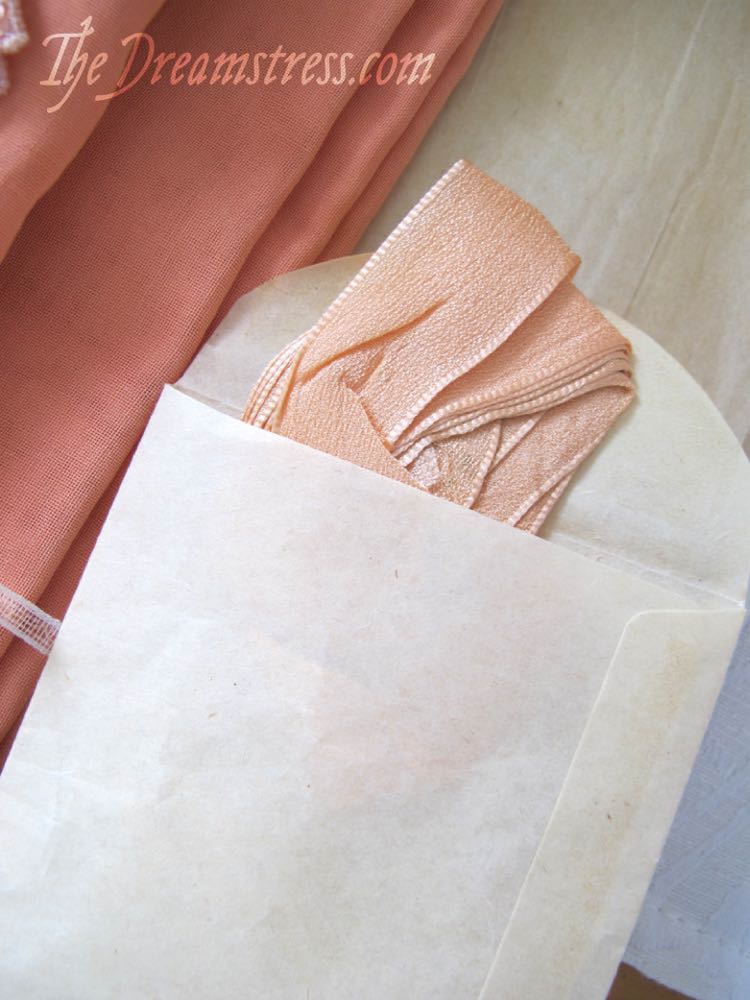
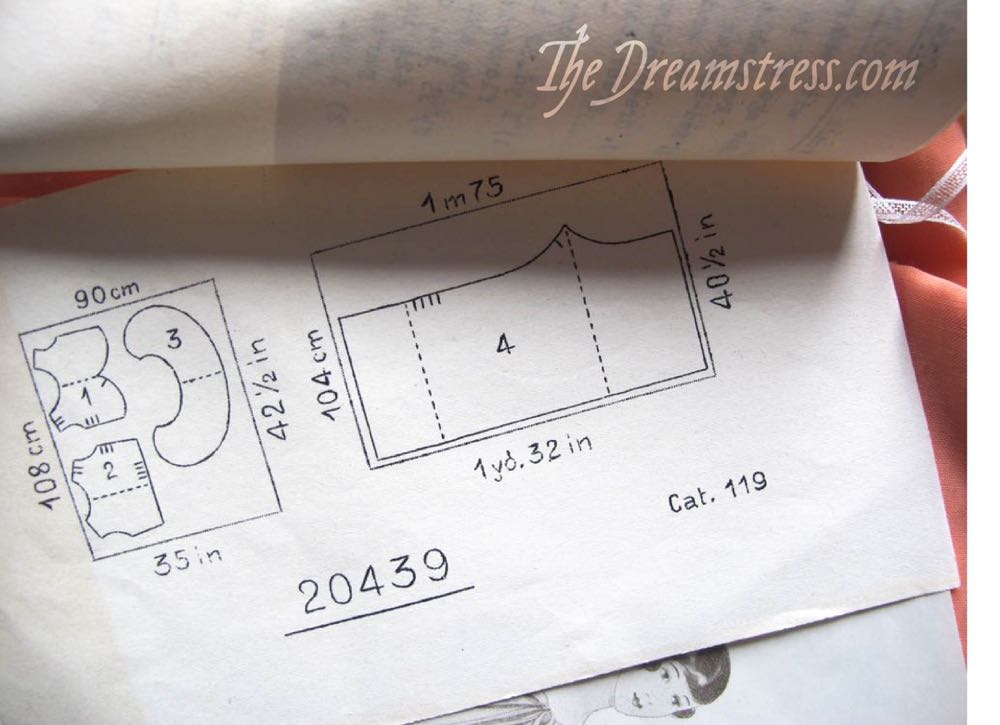
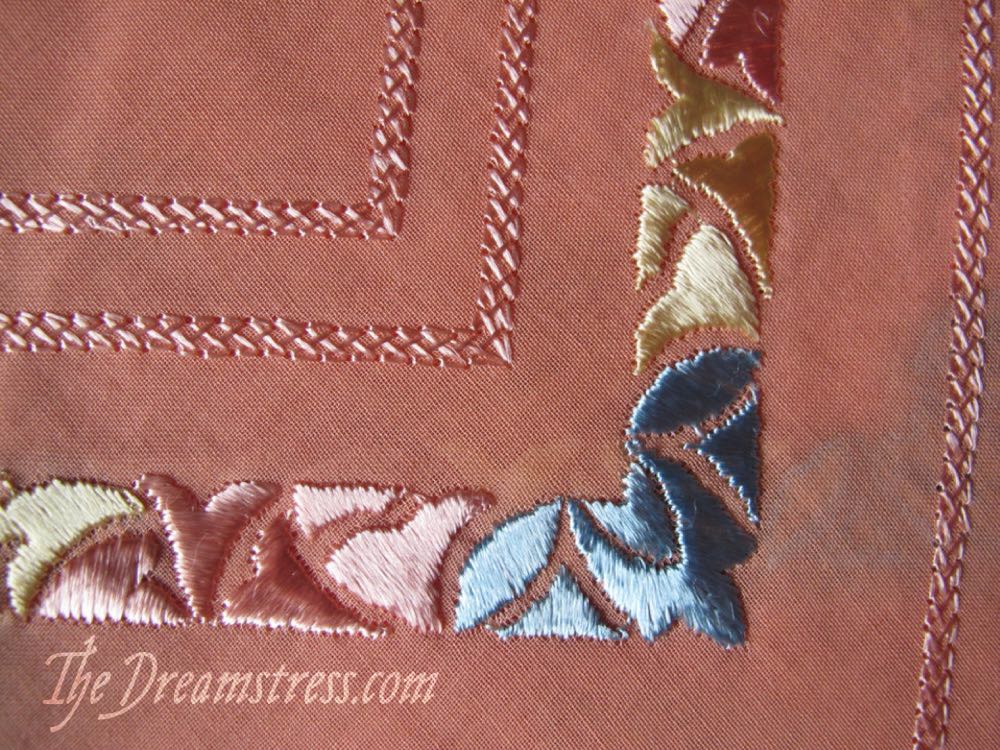
What a wonderful find. Stumbling across something like that must be so exciting!
Are you going to put it together?
That is SO cool. I love the idea of it as cooler-than-having-your-mom-make-everything but not-as-cool-as-FASHION middle-ground. Am I right in thinking that that’s where it would have sat, cost-wise? Was there wide-spread buying of ready-made clothes at that point, for middle-ish class girls? Or was it more along the line of that thing where you buy custom-printed fabric with pattern lines printed on it (i.e. DIY, as a hobby, not to save money)?
I know that middle class girls during 20s and 30s in the Texas panhandle (albeit at the cross of two very important rail lines) would have gone to a seamstress. I don’t know about kits, only the patterns…then again I never asked where they got the fabric. Too late, now, unfortunately.
That. Is. Amazing.
That is so, so cool!!
Sarah
Unbelievable. What a treasure!
This is wonderful! So amazing to find the entire kit intact after 90 years! The embroidered fabric is lovely and the frock is charming. I’m curious if that smocking at the waist?
Based on other sewing patterns and garments I’ve seen of the same era, it’s more likely to be fabric gathered with multiple lines of gather stitches. You can see the technique at the top of the sleeves of this jacket: https://thedreamstress.com/2012/02/elises-gift-the-leaf-green-velvet-jacket/
Oh goodness, thank you. I’m not sure why I said smocking, when gathering was what I was thinking. I couldn’t tell from the illustration if it was that or some other sort of embellishment.
Wow! Just Wow!
What a fascinating historical find!
The color is lovely, as is the embroidery. I don’t care for the capelet, but otherwise I would have loved this dress, when I was a teenager.
Yes, this really is exiting and very very interesting! For instance, I would have never gone for this (or any as brightly coloured) colour scheme. I didn’t know there were completely unmade dresses for sale, either, only dresses half made up. Well, I guess that’s because something like this would fit more into the sewing supplies section than in the clothing compartement, which is more likely to be represented in today’s reproductions of mail order catalogues. All the more reason to be delighted at this post of yours! Thank you!
(And by the way: There won’t be a Historical Sew Monthly 2017, will there? What a pity …)
There is going to be a HSM 2017 – the challenges have gone up on FB and I’ll get them up here soon 🙂
I share your excitement! Gosh, you do find some great things in op shops. I don’t have nearly half as much luck as you do. How I love that feeling of unearthing ‘treasure, ‘ that connection to the past. Better still, knowing that something like this is in safe hands and will be treasured for many more years to come. I will look forward to seeing how your frock turns out so we can imagine the kit brought to life.
What a beautiful, exciting find! Since I’m from eastern Switzerland myself, I was aware of the textile industry in that area, but to my knowledge it had mostly collapsed by that time, so I don’t think I’ve ever seen any Swiss products from that era. Herisau, where Sonderegger was from, is a small town near St. Gallen, which used to be the centre of the Swiss textile industry.
That is AMAZING. Absolutely a museum quality piece, definitely something that should be in a textiles/fashion museum.
Oh my word, this is the most amazing find! I think there would be a lot of squealing and dancing around if I spotted something like this. The fabric is stunning, but I’d definitely be like you and want to keep it all intact. Can’t wait to see your made up version!
sherwin-williams.comYowza! How lucky to find something so so so beautiful and stunning and absolutely perfect! My favorite part is the color combination. It is so neat to see color palettes change over the years. Sherwin-Williams paint company has a fun little site: https://www.sherwin-williams.com/architects-specifiers-designers/color/find-and-explore-colors/color-collections/color-through-the-decades
What a wonderful find! I’d probably frame the pattern and display it. The fabric is just gorgeous! I wouldn’t use it, I think I’d just look at it every. single. day. Good for you!!
I’m totally jealous! This is so cool
That’s a great find – I could feel the excitement myself!
I love the embroidery. What a cool way for a customer to get a beautifully embroidered dress without having to pay too much or spend forever doing the embroidery.
I love this. I don’t believe I’ve ever heard of dress kits before. This one is lovely – I love the hemline. Can’t wait to see what it looks like after you make it up. It is lovely fabric and the embroidery is gorgeous
What a great find, so many of the 1920s dresses are slowly disintegrating, yet the kit you found looks pristine! I had no idea there were sewing kits then, likely as they’re rare these days and not on pinterest. lol
Squee, what a wonderful and exciting find!
Amazing treasure to find! This is why I keep hunting, because the satisfaction of finding something amazing is so worth it. This is truly a beautiful piece of history!
So glad you had such a brilliant find in sunny Nelson! The antique shops here are real treasure troves. Loved the little packet of ribbon too 🙂
What an amazing find! I was thoroughly excited to find a turn of the century-ish corset at one of my local antique spots a few weeks ago, but it’s in MUCH worse shape. Great luck, and I can’t wait to see the version you make up!
Thank you for sharing this with us! I’m curious about the information sheet that says the dress is available in red and in blue, when the fabric looks pink.
I’m wondering about that too, and I’ve done a bit of research but can’t find anything conclusive, or other examples where a coral shade was described as pink. I really doubt the fabric has faded, as there are two separate pieces, the ribbon matches perfectly, and the colour is very consistent, and a very popular shade for teens in the 1920s. I suspect the other pink (mentioned as the embroidery on blue) was a very pale, blush pink. My best guess is that calling this coral tone red is a translation issue.
Pink as a word is peculiar to the English language/s, being of course derived from the colour of the little flowers with the “pinked” edges. Garden pinks (Dianthus spp) became fashionable in the 18th century, before that we simply called pink “red”. Hence many of the wild flowers with common name “Red”, when they’re plainly pink.
This change doesn’t seem to exist in many other European languages. I’ve just looked up the German translation for pink, and it’s “Rosa.” More specifically to your oddly described fabric colour, I have several books of Danish embroidery designs, in which the pink colours are called “Light red.” Depending on the dialect of the Swiss manufacturer, this is most likely the source of the translation discrepancy.
That’s exactly what I thought re: translation.
Wow! What a truly amazing thing to find.
Wow! That is such an amazing find!!! Thank you for sharing. 🙂
I’m with Jomama – Wow! Just wow!
On a completely different note, I have found washboards for sale
at a place called Capital Iron here in Victoria, BC, Canada. The
actual board is made of what I take to be galvanized metal rather
than glass, and it is only about 10 inches wide. Want one?
What a wonderful find! Thank you for sharing, and for the up close details of the embroidery.
There are no coincidences! You were MEANT to find this gorgeous item. And now it belongs to its rightful owner! I am thrilled for you.
I can’t wait to see what you create with the pattern and only hope you someday create the dress out of the kit – that is what its destiny should be and you are the one to do it.
Merry Christmas!